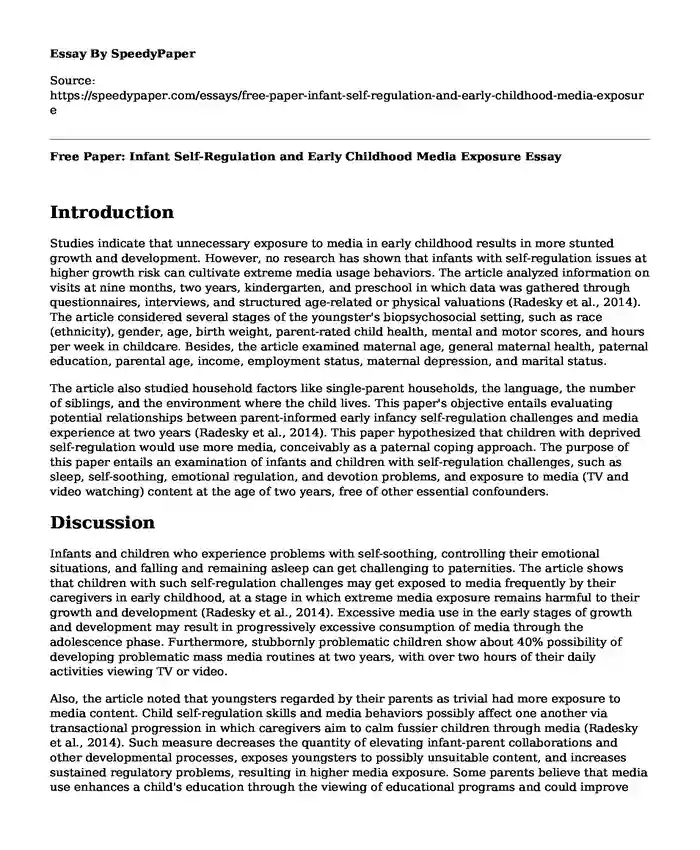
| Type of paper: | Essay |
| Categories: | Media Parenting Child development Childhood |
| Pages: | 3 |
| Wordcount: | 613 words |
Introduction
Studies indicate that unnecessary exposure to media in early childhood results in more stunted growth and development. However, no research has shown that infants with self-regulation issues at higher growth risk can cultivate extreme media usage behaviors. The article analyzed information on visits at nine months, two years, kindergarten, and preschool in which data was gathered through questionnaires, interviews, and structured age-related or physical valuations (Radesky et al., 2014). The article considered several stages of the youngster's biopsychosocial setting, such as race (ethnicity), gender, age, birth weight, parent-rated child health, mental and motor scores, and hours per week in childcare. Besides, the article examined maternal age, general maternal health, paternal education, parental age, income, employment status, maternal depression, and marital status.
The article also studied household factors like single-parent households, the language, the number of siblings, and the environment where the child lives. This paper's objective entails evaluating potential relationships between parent-informed early infancy self-regulation challenges and media experience at two years (Radesky et al., 2014). This paper hypothesized that children with deprived self-regulation would use more media, conceivably as a paternal coping approach. The purpose of this paper entails an examination of infants and children with self-regulation challenges, such as sleep, self-soothing, emotional regulation, and devotion problems, and exposure to media (TV and video watching) content at the age of two years, free of other essential confounders.
Discussion
Infants and children who experience problems with self-soothing, controlling their emotional situations, and falling and remaining asleep can get challenging to paternities. The article shows that children with such self-regulation challenges may get exposed to media frequently by their caregivers in early childhood, at a stage in which extreme media exposure remains harmful to their growth and development (Radesky et al., 2014). Excessive media use in the early stages of growth and development may result in progressively excessive consumption of media through the adolescence phase. Furthermore, stubbornly problematic children show about 40% possibility of developing problematic mass media routines at two years, with over two hours of their daily activities viewing TV or video.
Also, the article noted that youngsters regarded by their parents as trivial had more exposure to media content. Child self-regulation skills and media behaviors possibly affect one another via transactional progression in which caregivers aim to calm fussier children through media (Radesky et al., 2014). Such measure decreases the quantity of elevating infant-parent collaborations and other developmental processes, exposes youngsters to possibly unsuitable content, and increases sustained regulatory problems, resulting in higher media exposure. Some parents believe that media use enhances a child's education through the viewing of educational programs and could improve their behaviors. However, the article found no relation between parents' co-viewing conduct and child self-regulation, indicating that parents do not use media to improve problematic children's behaviors (Radesky et al., 2014). Providing parents with alternative coping approaches can ensure that children with self-regulation challenges improve their behaviors. Childhood self-regulation and early childhood mental and social self-regulation can be enhanced over a given period through profound, approachable parenting.
Conclusion
Early childhood remains a vital period in the development of future media behaviors and may influence future interventions. Further research on whether assisting parents in handling their children's problematic habits may decrease extreme media consumption behaviors. Pre-emptive regulation in pediatric training could emphasize conversing with parents about their inspirations concerning media selections and recommending healthier media usage toward more prosocial or educational programs. Future research can evaluate whether youngsters with self-regulation challenges remain differentially vulnerable to the advancement influences of unwarranted media consumption.
Reference
Radesky, J. S., Silverstein, M., Zuckerman, B., & Christakis, D. A. (2014). Infant self-regulation and early childhood media exposure. Pediatrics, 133(5), e1172-e1178. www.pediatrics.aappublications.org/content/133/5/e1172.short
Cite this page
Free Paper: Infant Self-Regulation and Early Childhood Media Exposure. (2023, Nov 15). Retrieved from https://speedypaper.net/essays/free-paper-infant-self-regulation-and-early-childhood-media-exposure
Request Removal
If you are the original author of this essay and no longer wish to have it published on the SpeedyPaper website, please click below to request its removal:
- Check the Pros of Video Games in the Free Essay Example
- Edward Scissor Hands Character Analysis Top-Rated Essay Example
- Free Essay with History of Video Games
- Free Essay on Personal Code of Ethics
- Essay Example. "American Sniper" and Just War Theory
- Free Essay. Curriculum Activity Cognitive and Language Development
- The U.S.'s Role in Climate Change. Paper Example
Popular categories




